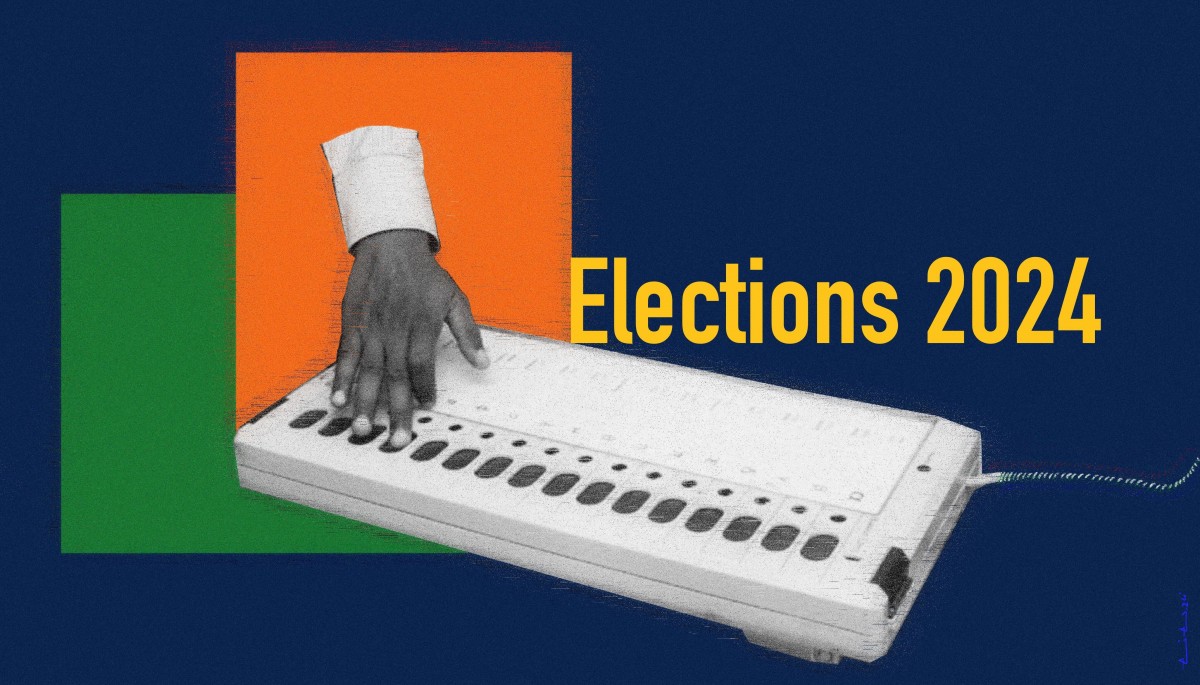Kerala: CPI (M) Takes Stock of Shift in Political Dynamics, Analyses Reasons for LDF's Rout
The Communist Party of India (Marxist), or CPI(M), Kerala state committee undertook a thorough introspection following their defeat in the 2024 Lok Sabha elections. Despite the CPI(M)-led Left Democratic Front (LDF) making history by coming back to power for a second consecutive term in the state, their poor performance in the general elections raised significant concerns. The party had expected to secure at least eight seats but fell far short of these predictions, ending up winning just one seat. This prompted a detailed analysis of their strategies and performance.

Illustration: Pariplab Chakraborty
The CPI(M) organised a three-day state-level meeting from June 17 to 19 in Thiruvananthapuram to scrutinise their approach and identify areas of improvement.
Following the meeting CPI(M) state secretary M.V. Govindan, addressing the media, on June 20 acknowledged, “In Kerala, the LDF did not achieve the expected success; it was a major setback. The UDF won 18 seats and the most concerning aspect is that the BJP managed to secure one seat.”
CPI (M)-led Left Democratic Front (LDF) managed to hold on to just one seat, in Alathur with the state's former minister for welfare of Scheduled Castes, Scheduled Tribes and Backward Classes, Dewaswoms, and parliamentary affairs K. Radhakrishnan.
Govindan pointed out that the Social Democratic Party of India (SDPI), the political arm of the banned Popular Front of India (PFI), Welfare Party, Solidarity Youth Movement and Jamaat-e-Islami Hind did not field candidates and instead directed their voters to support UDF. He expressed concern over the implication of this alliance, emphasising that it would have far-reaching consequences for Kerala’s political landscape.
Also read: Kerala 2024: UDF Dominates, BJP Breaks New Ground
He said that this "fundamentalist alliance" had influenced Indian Union Muslim League (IUML) state president Syed Sadikali Shihab Thangal’s perspective on the CPI(M). Thangal claimed that the CPI(M) had supported the Palestinian cause and Saddam Hussein to attract Muslim votes, and that the party was inherently opposed to religion and faith.
Govindan emphasised that the CPI(M) adopts positions based on international politics, maintaining a strong anti-imperialist stance. The party consistently opposed imperialist policies and actions and will continue to uphold this principle.
Govindan highlighted the concerns regarding the Sree Narayana Dharma Paripalana Yogam’s (SNDP) leadership. SNDP is a social service organisation that has been representing the Ezhava community since 1903. He criticised their rejection of Sree Narayana Guru’s philosophy of one caste, one religion, and one god, which traditionally held humanism over religious dogma. Sree Narayana Guru was a social reformer, philosopher and spiritual leader, who led a reform movement against the caste.
This rejection, Govindan argued, had gradually alienated some sections of the Ezhava community, pushing them towards the sangh parivar. He called upon progressive elements within the SNDP Yogam to realign the organisation with Guru's teachings and prevent further rightward drift within its leadership.
Govindan also criticised the sangh parivar for promoting retrogressive and casteist principles in Kerala. He accused them of using identity politics to undermine the progressive values advocated by social reformers and the Renaissance movements in the state.
Highlighting a shift in political dynamics, Govindan pointed out that a segment of the Christian community, traditionally supporters of the UDF and opponents of Hindutva, had shown support for the BJP, particularly in Thrissur. He noted instances where bishops, possibly under pressure from central agencies and facing scrutiny over foreign funding, were seen at BJP functions.
He dismissed the media reports of severe flak against chief minister Pinarayi Vijayan within the state committee and denounced attempts by right-wing media to defame him. He said, “There was a concentrated effort to damage Vijayan’s image, with ongoing media attacks on him and his family. This negative campaign has, to some extent, influenced the voters.”
Govindan acknowledged that delays in disbursing welfare pensions and dearness allowance (DA) to government employees affected public perception. "Our capacity to provide these vital payments to the people was severely restricted by the Centre’s policy of financially undermining Kerala, which the Congress backed. The situation had a major impact on the outcome of the vote,” he said.
Looking ahead, Govindan reaffirmed the CPI(M)'s commitment to combating caste-based identity politics and Hindu majoritarianism by revitalising class consciousness among the working class.
“We will go to the people, holding local-level conventions to clear up misunderstandings and address their concerns. Comprehensive corrections are needed at every level, and we will meticulously analyse the situation from top to bottom. The party will also evaluate and prioritise our future actions. Kerala is a place where the CPI(M) can make a comeback, and we have proven it before,” he said.
This article went live on June twenty-second, two thousand twenty four, at fourteen minutes past one in the afternoon.The Wire is now on WhatsApp. Follow our channel for sharp analysis and opinions on the latest developments.




